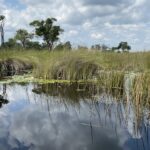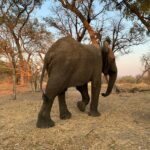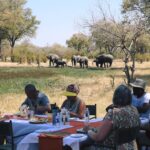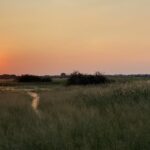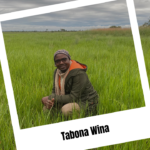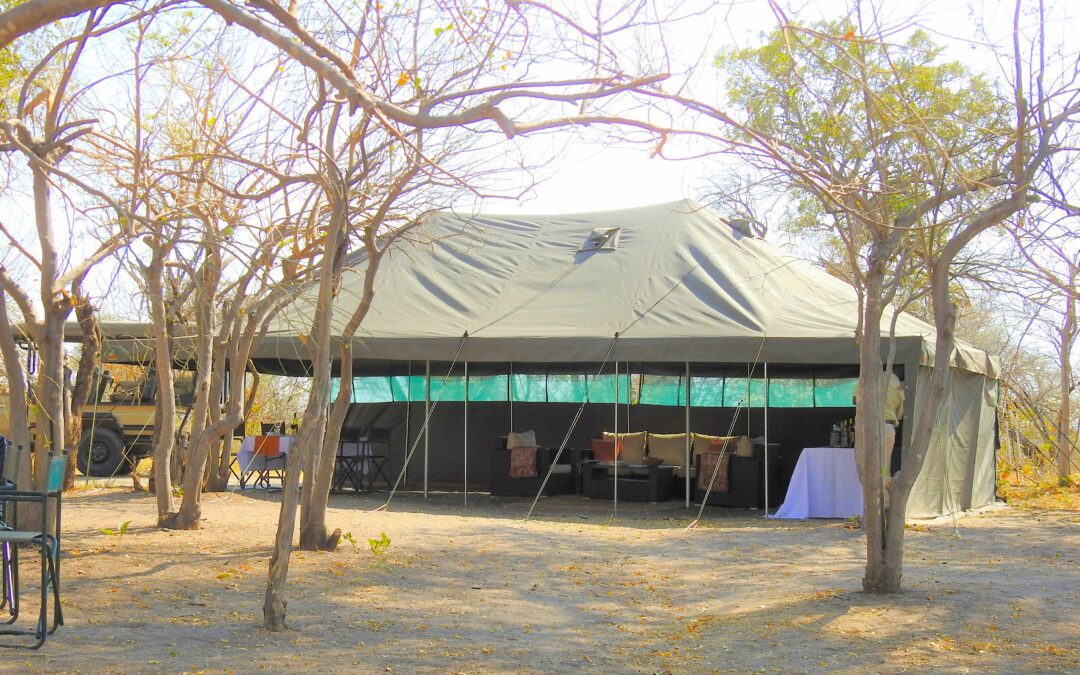
Nov 29, 2019 | Brave Africa Safari, Most Popular Blogs, Safari Tips
Before you go on a safari in Botswana, you have to do your research. Safaris are not cheap, and the last thing you want to do is try to save money and end up with a sub-par experience and a safari camp or lodge that’s far below your expectations.
The problem is that there’s both too much and too little information out there. We’ve been where you are and have spent countless hours (days!) online trying to figure out what it’s like to go on an African safari.
And trying to figure out where to stay? Forget it!
You might as well just close your eyes and pick an African safari lodge or camp at random. After all, they can’t be that different than each other. But that’s where you’re wrong.
Every Safari Accommodation is Different
While both safari lodges and safari camps offer incredible experiences and can share many of the same features, there are some major differences and similarities you need to be aware of before you make your choice. (And don’t forget to check out our similar blog about safari vehicles.)
Our goal is not to sway you toward any specific safari accommodation over another, but to provide you with an in-depth overview of your options so that you can make the best choice for you.
First, a warning…pictures are not always accurate. Some safari camps and lodges are known for photoshopping their images or putting pictures online that don’t match their typical product, but instead require hundreds or thousands of dollars in upgrades. Don’t trust what you see. Instead, be sure to do your own research and ask questions. Look for customer pictures on TripAdvisor or Google Business, or work with a travel agent who has visited the camp and can confirm that what you see is what you get.
Botswana Safari Accommodation Features
Now, before we jump into the different types of accommodations, let’s talk about a few key features of your safari vacation.
- Bedroom: Your sleeping situation can drastically change depending on your camp. Be sure to ask if you have a normal mattress bed or cots, and if the bed can be set up as a king or just two twins. Also, the size of your tent can be anything from a small dome you can’t stand inside to an extensive lodge suite and everything in between.
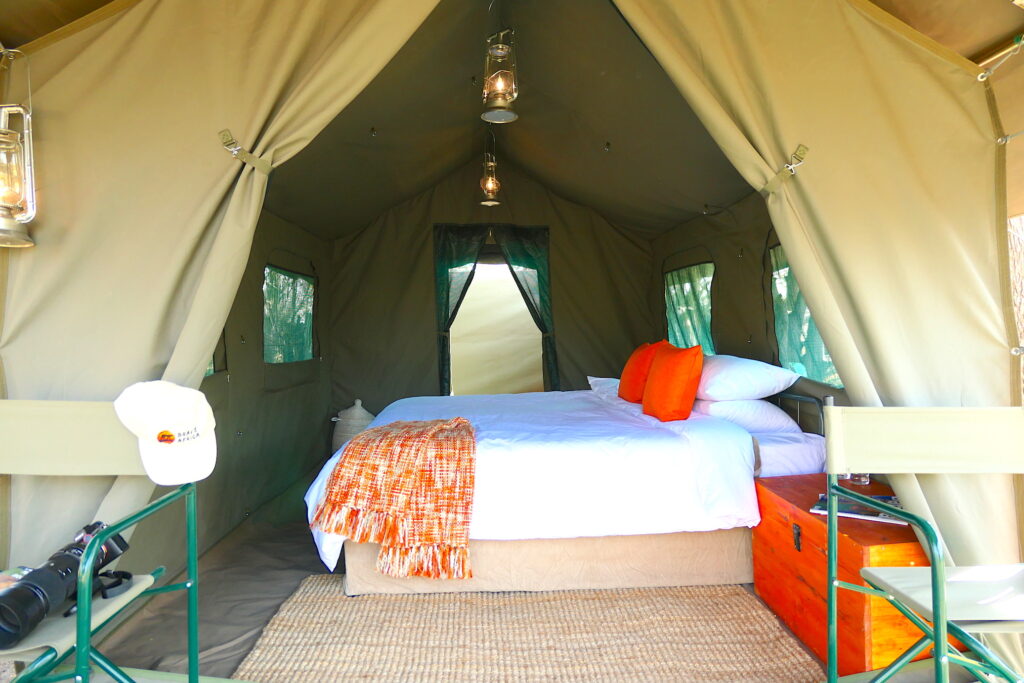
- Bathroom: Not every safari camp includes an attached toilet and bath/shower. Most safari lodges will have a flushing toilet and shower, but bucket showers are still common even in luxury lodges. For mobile camps, drop toilets are typical and showers may be communal.
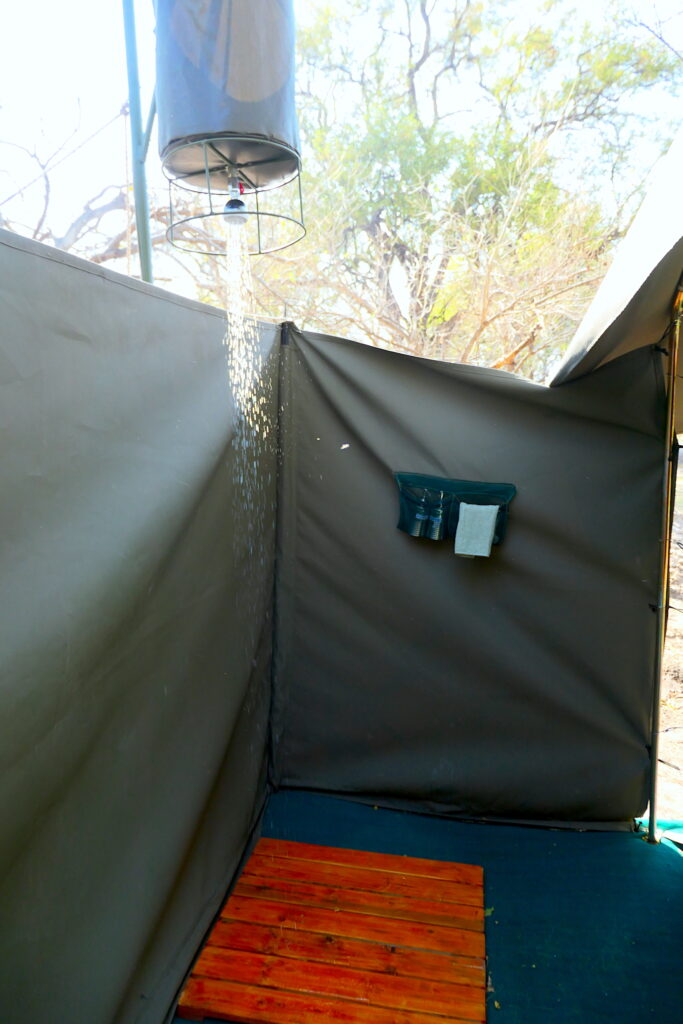
This is our custom-built shower add-on to every tent. It provides an additional 1.5 meters of space for our guests to enjoy and ensures your tent isn’t soaked during your shower.
- Shared Areas: Think of shared areas as similar to a hotel lobby or the living and dining room in your home. Every safari camp will have a campfire where you’ll hang out regularly. However, the type and size of your dining area can vary greatly, so can any sitting areas, the bar, and more. Some lodges may also have a pool.
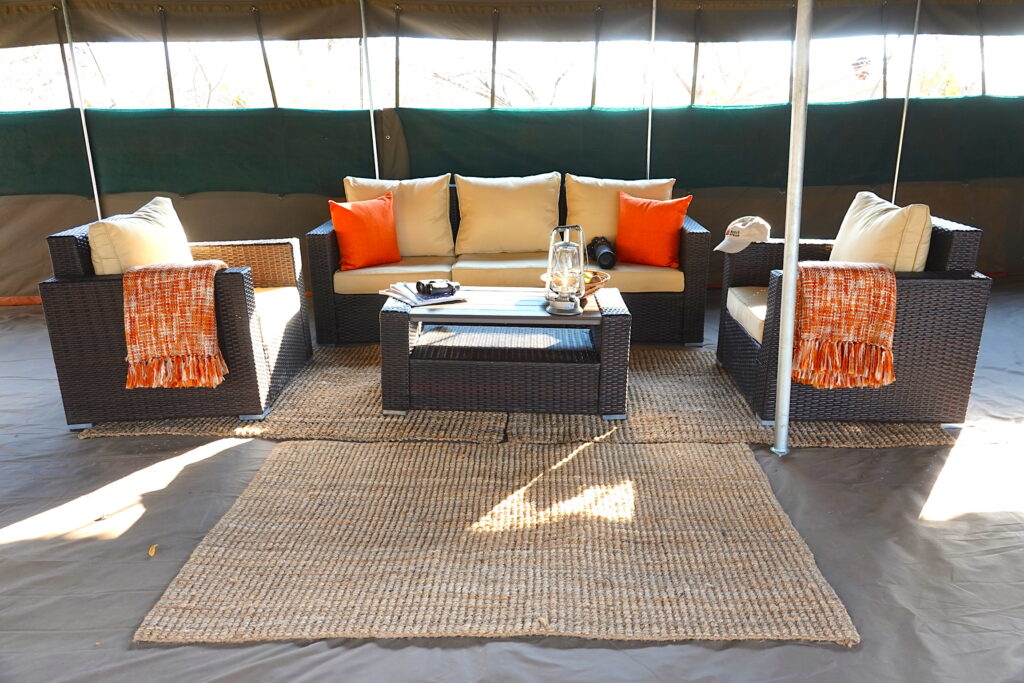
- Power Outlet: At most safari lodges and camps, all power outlets are found in the shared areas. Your room will not have the ability to charge technology. Any charging you want to do in your room will require travel batteries and some camps may only offer charging via a car battery.
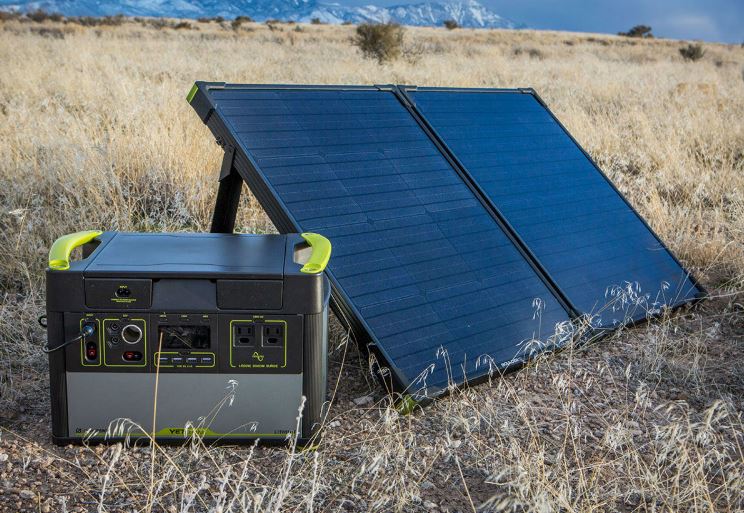
- Internet Access: Very few, if any, Botswana safari camps offer access to the internet. The goal of a safari is to unplug, so do not expect internet or mobile to work while on safari. Instead, use your safari as an opportunity to forget that the rest of the world exists. (We do have a satellite phone available for emergencies.)
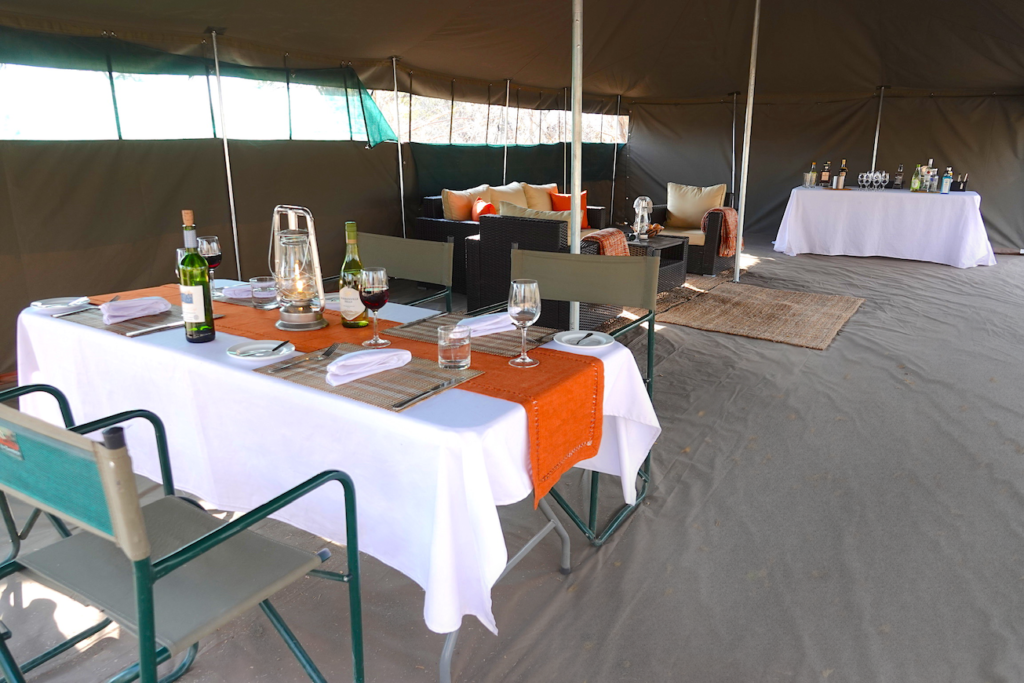
- Food: Most lodges and camps have a chef, but the type of food they serve can very. For many mobile safari camps, cooking is done over an open fire, which can drastically limit the menu. However, some mobile camps, including Brave Africa, have an entire outdoor kitchen with a full stove and oven, which means the chef can cook the same types of meals you’d find in any hotel or restaurant.
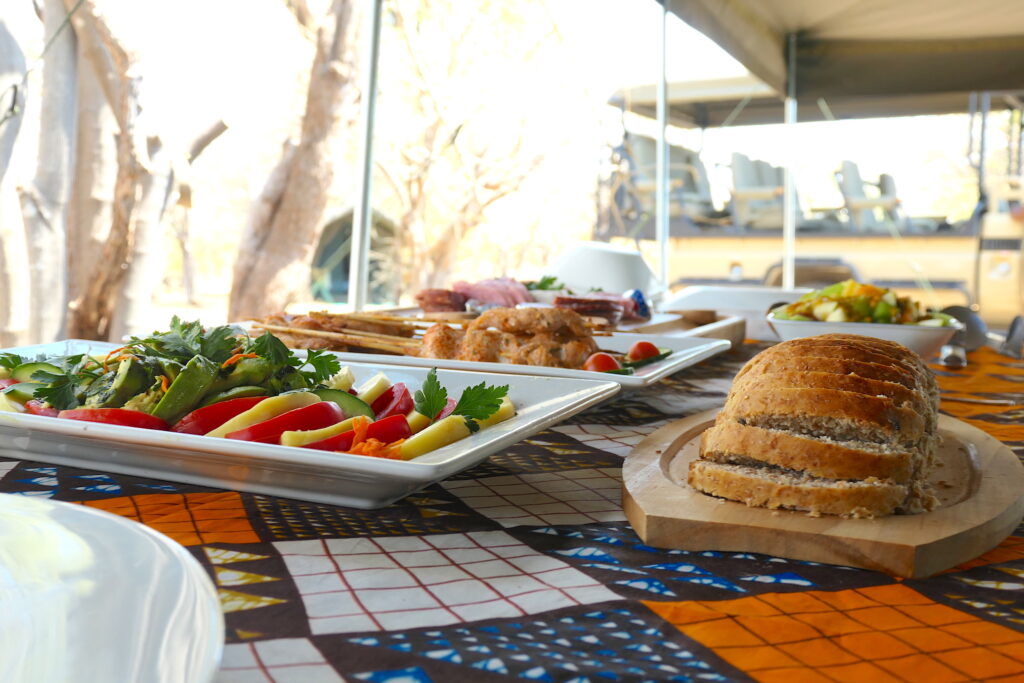
Safari Lodge vs. Safari Camp
Now, let’s look at the more specific differences between safari lodges and safari camps to help you make your final choice of accommodation. When going on safari in Botswana, you typically have three choices:
- A luxury safari lodge,
- A mobile safari camp
- A self-drive safari camp
Botswana Safari Lodge
A Botswana safari lodge is more like a luxury safari hotel. It’s a structure that remains in one location that you, as a safari guest, travel to and stay at. Typically, safari lodges will have communal areas that act like hotel lounges. There’s probably a dining hall, a reception, and a pool. Safari lodges are often built with wood, though rooms can still be canvas tents, but they offer more of a hotel-like feel. Expect:
- Suite-type rooms with comfortable beds and lots of space
- Luxury bathrooms with running water
- Large communal areas for dining and relaxing, including a pool
- Technology charging in the main communal area
- No internet access except at the more premium lodges
- Premium, chef-designed meals
All Botswana safari lodges are 100% focused on a luxury experience. They are beautifully crafted locations that are dedicated to your comfort. Guests can expect many similar features to a luxury hotel room.
Mobile Safari Camps
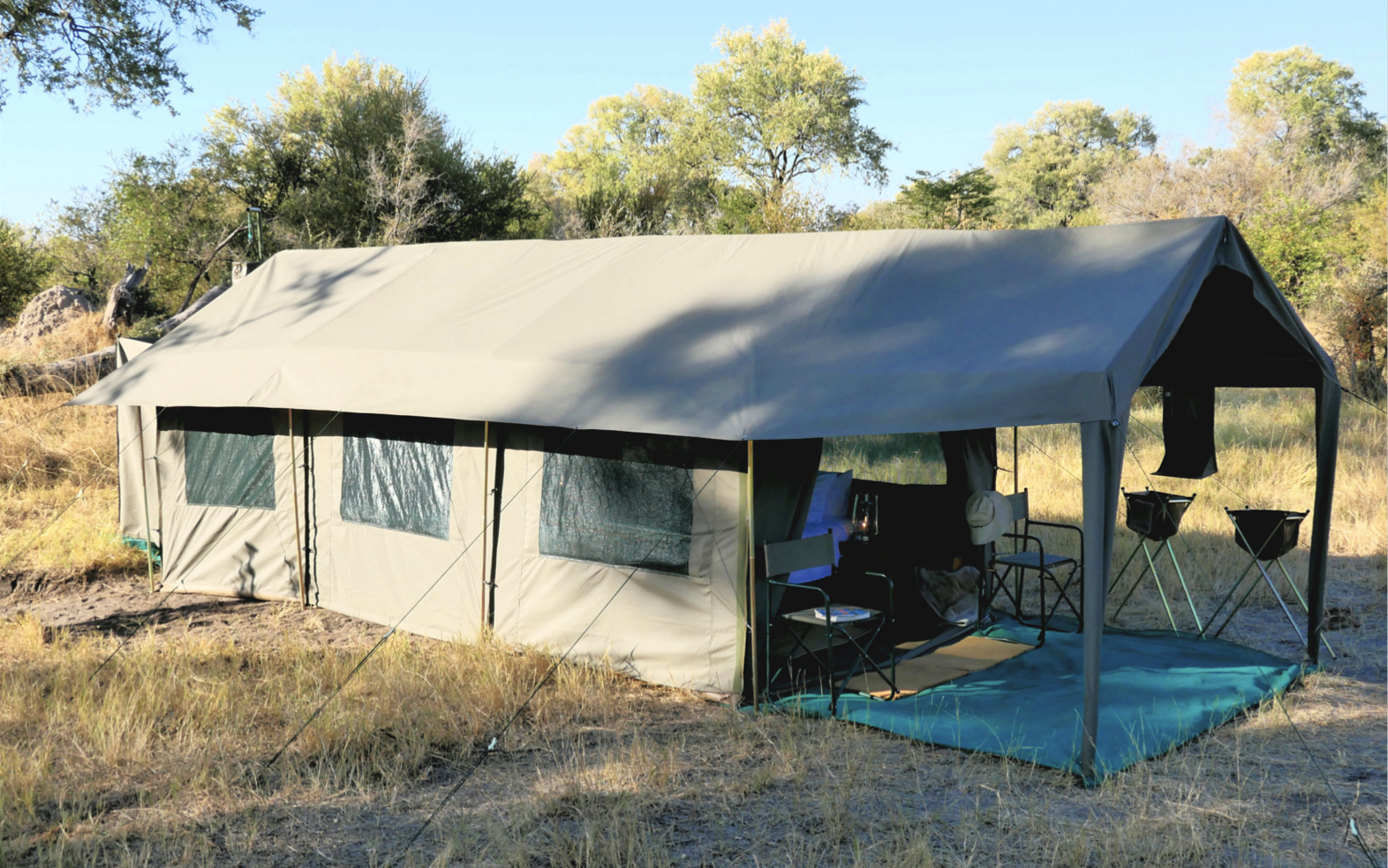
The second type of safari accommodation you’ll find in Botswana are the mobile safari camps. These can vary depending on how much you’re willing to pay and the type of experience you want. There are five types of mobile safari camps you can expect: budget, standard, premium, luxury, and ultra-luxury.
It’s important to note that the naming conventions we used above are NOT standard for the industry. Many standard camps use the phrase “luxury” to sell rooms. Before you take any naming at face value, ask about the type of experience you’re going to enjoy.
Budget Mobile Camping
With extreme budget mobile camping, your operator will provide tents, meals, and basic amenities, but the rest will be up to you. You may be expected to build your own very small dome tent or to participate in cooking. As for your sleeping and bathing arrangements, sleeping bags or cots are typical and toilets/showers might be shared.
Standard Mobile Camping
With standard mobile camping, the experience is a little more all-inclusive. You’ll still have small dome tents with limited amenities. However, the company will take care of setting up and tearing down your tent and all of the cooking. Think of this as camping with a team that takes care of the basic details. Bathing arrangements may still be shared between camp guests, though you should have your own drop toilet near your tent.
Premium Mobile Camping
Premium mobile camping will get you bigger tents with a little more room to move around. With these safari camps, you’ll have your own private toilet (drop) and bucket shower, typically connected to your tent. You still might sleep on cots, but all of your amenities are a little more premium, including your food—it will be cooked over a fire by a chef. You should also have a small dining tent that can be used as a shared communal area.
Luxury Mobile Camping
Luxury mobile camping upgrades all of your features. Your tent should be large enough for a King bed setup with extra room to move. The toilet and bathing amenities should be top-notch. You may have a flushing or a drop toilet, but the entire experience should feel much more luxurious—these experiences are often referred to as “glamping.” Meals may still be cooked over a fire, but should also include higher-quality ingredients and more variety. Communal areas tend to be on the small side, but they are comfortable though mainly used for dining.
Ultra–Luxury Mobile Camping
There are very few ultra-luxury mobile camps; Brave Africa is one. These are lodge-like camps where you shouldn’t feel as if you’re camping at all. Toilets are flushing, and tents are very spacious with comfortable mattresses, storage space, luxury amenities, and private on-demand bathing. As for the communal areas, they are much more expansive and include a seating area, room for dining, and a bar set up where guests can hang out at any time. Food should be cooked in a mobile kitchen with a full oven and stove, not over a fire, and premium alcoholic beverages are available.
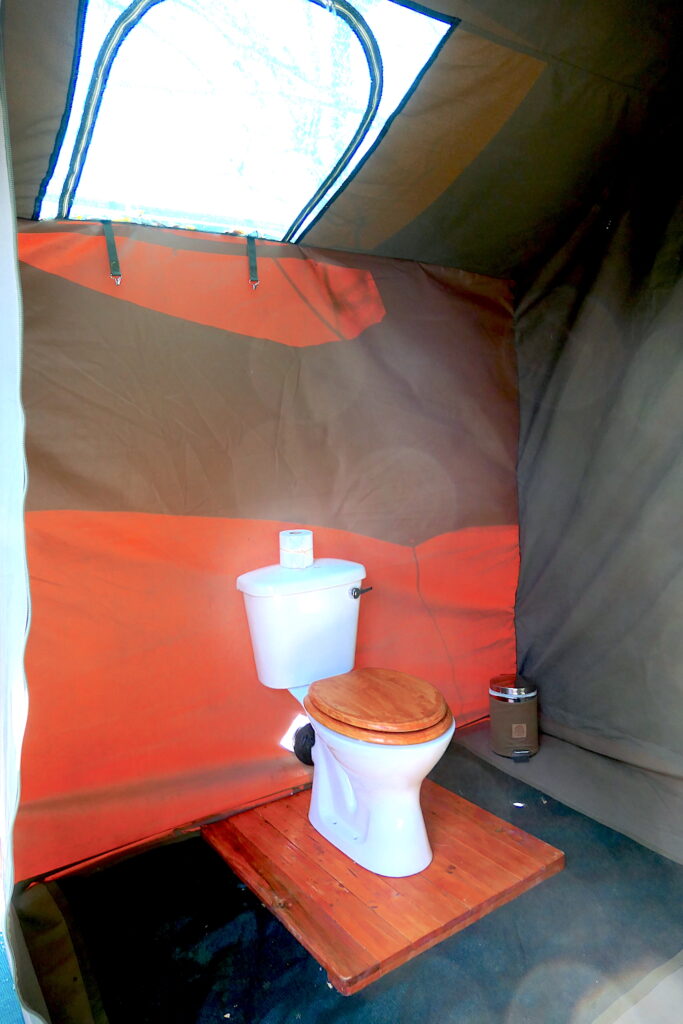
Brave Africa flushing toilet
Self-Drive Camps
Lastly, there are self-drive camps. This is camping at its most basic. You’ll have your own car, which comes with basic camping amenities. You are in charge of everything, including all supplies. You’ll be limited to campgrounds that are open to self-drive tourists and have to share communal bathing and toilets with all other self-drive guests.
Brave Africa’s Ultra-Luxury Mobile Safari Camp vs. a Safari Lodge
| Amenities |
Standard Mobile Camp |
Typical Safari Lodge |
Brave Africa Camp |
| Bed |
Cots (twin beds) |
Typical mattress bed (king or twin) |
Typical mattress bed (king or twin) |
| Tent Size |
Very small, little room to move |
Luxury suite |
Comfortable hotel-room size |
| Toilet |
Drop |
Flushing |
Flushing toilet |
| Shower |
Bucket shower (potentially communal) |
Standard hotel shower with running water |
Private bucket shower |
| Sitting area |
Captains’ chairs only |
Comfortable couches and chairs for relaxing |
Comfortable couches and chairs for relaxing |
| Dining area |
Small tent for dining or around an open fire |
Large dining room |
Large dining room |
| Pool |
No |
Yes |
No |
| Power |
Shared power in the main area, may be limited to a car battery |
Shared power in the main area typically solar-powered |
Shared power in the main area typically solar-powered |
| Internet Access |
No internet access |
No internet access in the most premium camps |
No internet access |
| Food |
Cooked over an open fire |
Chef-created in a full kitchen |
Chef-created in a full kitchen |
https://www.youtube.com/watch?v=5QOObpI95JU
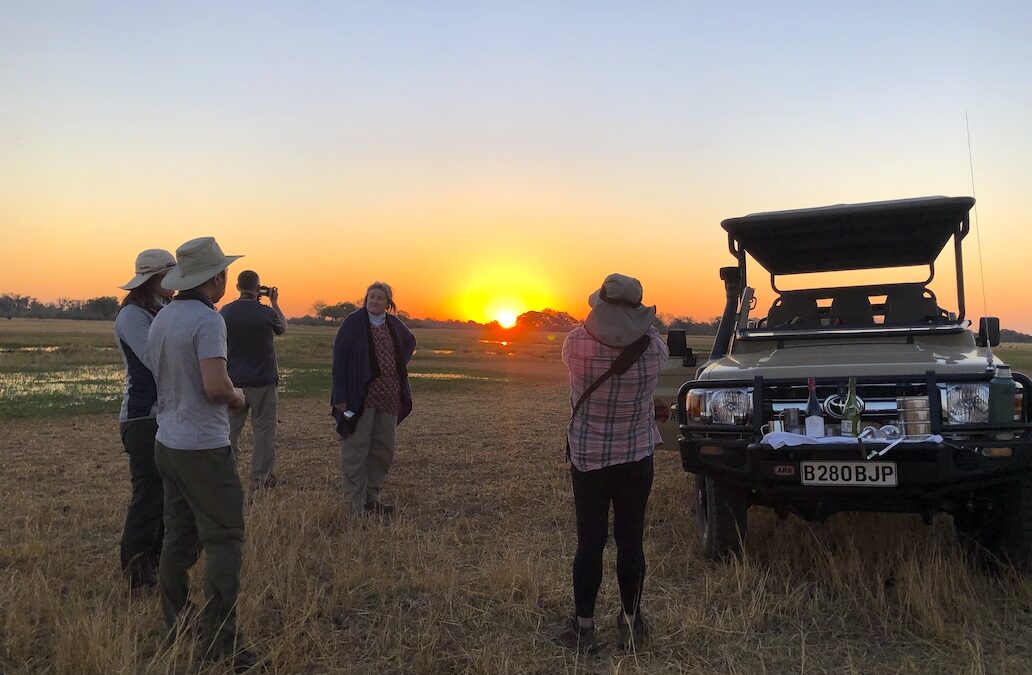
Oct 19, 2019 | Adventure Safari, Brave Africa Safari, Conservation, Most Popular Blogs
Before you decide where to go on your African safari, check out our ten reasons to go on safari in Botswana. We know you’ll love the Okavango Delta, Kalahari Desert, and Chobe National Park. Because if you’re looking for a safari that offers:
- 130,000 elephants
- Fewer crowds
- Conservation-focused tourism
- Incredible scenery
- 3,000 lions
- An adventurous experience
- Remote locations
- LGBTQ+ friendly policies
- Friendly people
- The best safari location in Africa
Look no further than Botswana! It’s truly a one-of-a-kind destination that everyone should experience.
1. 130,000 Elephants – The most of any African country
Botswana is known as “The Land of the Giants.” The country boasts 130,000 elephants, almost double the number of elephants you’ll find anywhere else in the world. This makes Botswana a haven and last refuge for these majestic creatures for the last 15 years.
What this means is that when you go on safari in Botswana, you’re almost guaranteed to see elephants every single day, multiple times a day. In fact, on our most recent trip out, we rarely had lunch without a few elephants stopping at a nearby watering hole to drink while we ate. Elephants roamed near our camp, came directly up to our safari car, and were almost everywhere we looked.
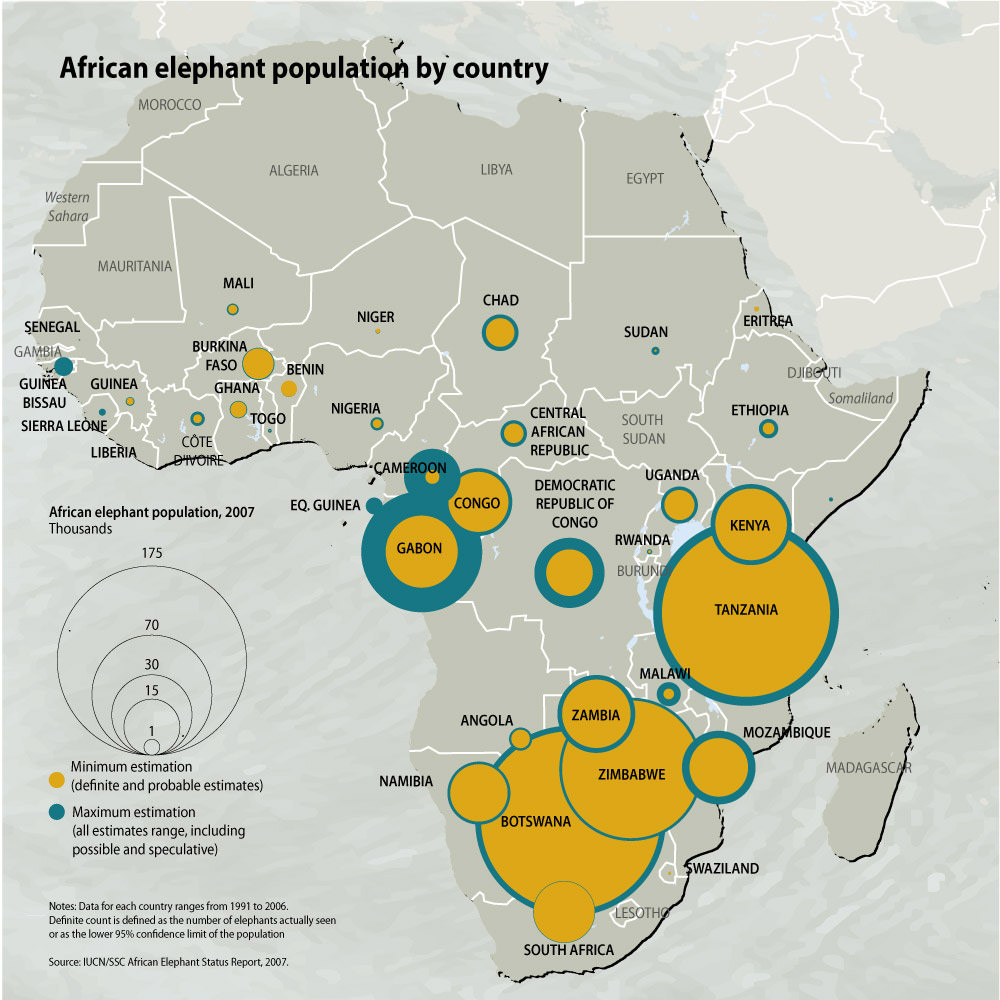
Botswana has the highest concentration of elephants by far.
2. Fewer Crowds — The experience is focused on quality, not quantity
The last thing you want when you go on safari is to be surrounded by crowds of people. After all, you’re heading to Africa to see the wildlife, not more tourists.
Botswana is considered the “road less traveled.” Fewer people think about Botswana when they consider locations for their African safari, and so there are far fewer tourists. For example, in Kenya’s Masai Mara, there are 7,000 beds available for tourists. In Botswana’s Linyanti Reserve (just outside of Savuti), there are only 58 beds in the same size area.
Botswana also has legislation in place that limits the number of tourists that can be in any single area. You won’t find as many tourists on safari in Botswana’s Okavango Delta, Chobe National Park, or the Kalahari Desert, and the camps are kept small. Most camps, including Brave Africa, max out at six tents, 12 guests. We also max out our safari vehicles at just six guests, so that every row has only two people and no middle seat.
The idea of Botswana is to have fewer crowds and more animal encounters. And isn’t that what you want?
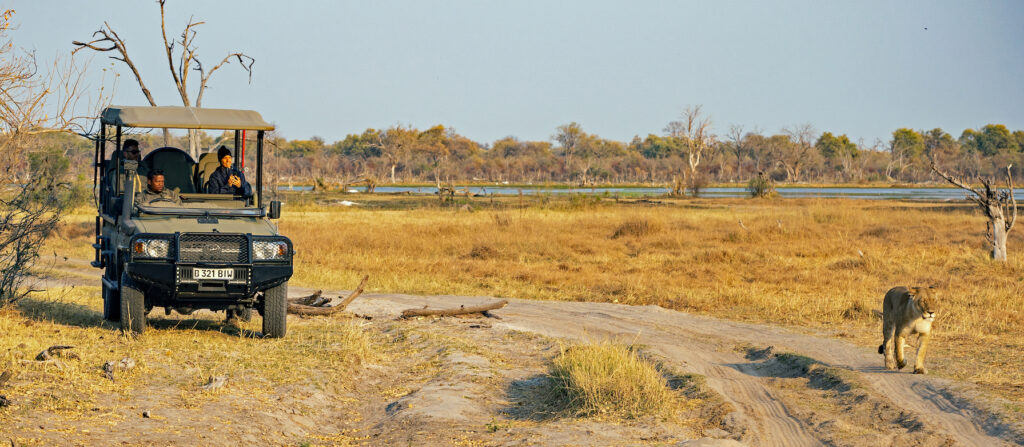
3. Conservation Focused — Botswana is ranked #1 in the world for conservation
Botswana is considered one of the last sanctuaries in Africa with untouched wilderness, making it a haven for endangered species. More than 25% of Botswana’s land area has been set aside for parks and reserves, dedicated to protecting the stunning landscapes and wildlife.
In 2017, the Lonely Planet ranked Botswana the #1 country in the world for conservation, saying, “they keep visitor numbers deliberately lower than they could so that they can manage the environmental impact of wilderness tours.”
For example, let’s take a look at rhinos. In 2001, Botswana had no rhinos left, so the country passed serious legislation focused on combatting poachers and protecting wildlife. Poaching in Botswana was punishable by death for a few years, and they are the only country to deploy the national military to keep poachers out. Today, around 400 rhinos have been reintroduced to the Okavango Delta.
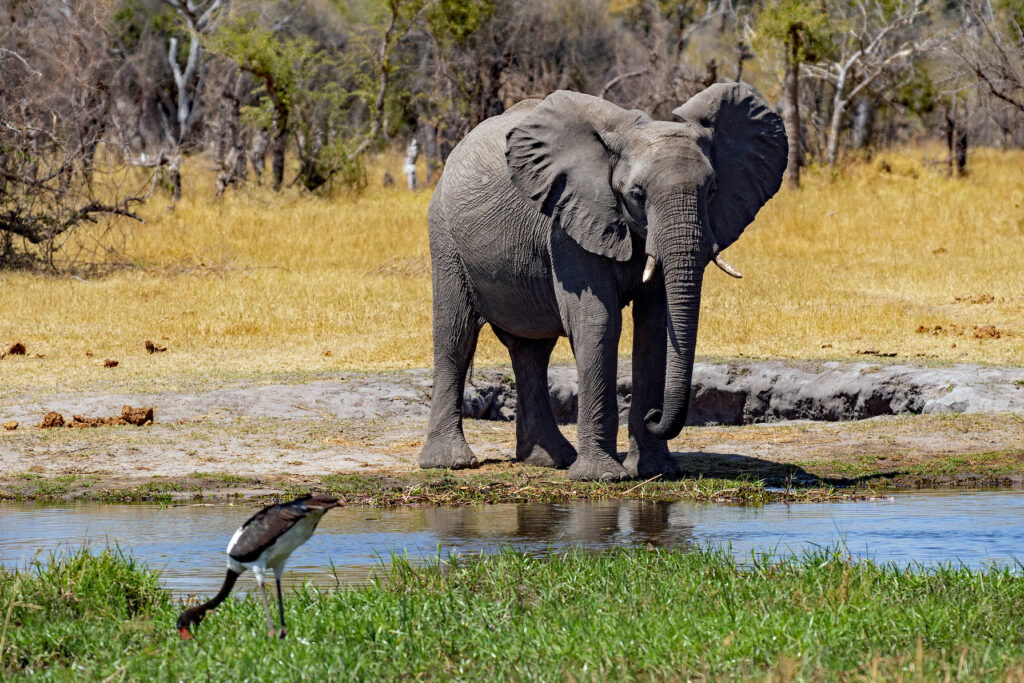
4. Incredible Scenery — Varied and stunning landscapes in the Okavango Delta, Kalahari Desert, and Chobe
Botswana is home to some of the most pristine and stunning landscapes in all of Africa. You can find a little bit of everything in the country from dusty red deserts to lush swamplands, sweeping floodplains, expansive savannahs, and vibrant forests. Honestly, during one all-day game drive, you can travel through a complete range of raw, rugged, and stunning landscapes.
In particular, the magical Okavango Delta stands out as Botswana’s main draw. It’s 16,000- square kilometers of wilderness with some of the densest wildlife in the world. The area is considered one of the largest inland water systems on the planet and home to one of Africa’s most diverse and vibrant ecosystems.
It’s a dazzling area with an abundance of lions, wild dogs, leopards, hippos, elephants, giraffe, kudu, and more. Then, there’s the Kalahari Desert that extends 900,000 square kilometers and covers much of Botswana. A semi-desert, it offers vast tracts of land that are excellent for grazing after good rains. This area is home to black-manned lions, oryx gazelle, and the incredible flamingo migration in Makagadikgadi Pans.
5. 3,000 Lions — Second only to Tanzania in lion populations
Lions can also be found throughout Botswana. In fact, after Tanzania, Botswana claims the largest population of lions in Africa. They thrive throughout the Okavango Delta, Central Kalahari, and Savuti. Best yet, lions in Botswana have some unique distinctions.
The Kalahari Desert is the only place in the world where you can see black-manned lions. These lions are known for their massive size and beautiful manes. Beyond their stunning manes, they also tend to have higher levels of testosterone, a better chance of survival, and a healthier disposition.
Then, in Savuti, there’s a pride of lions known as elephant killers. This incredible pride has learned how to take down adult elephants. While it’s not something you particularly want to witness, it makes the Savuti lions stand out for their unique hunting habits.
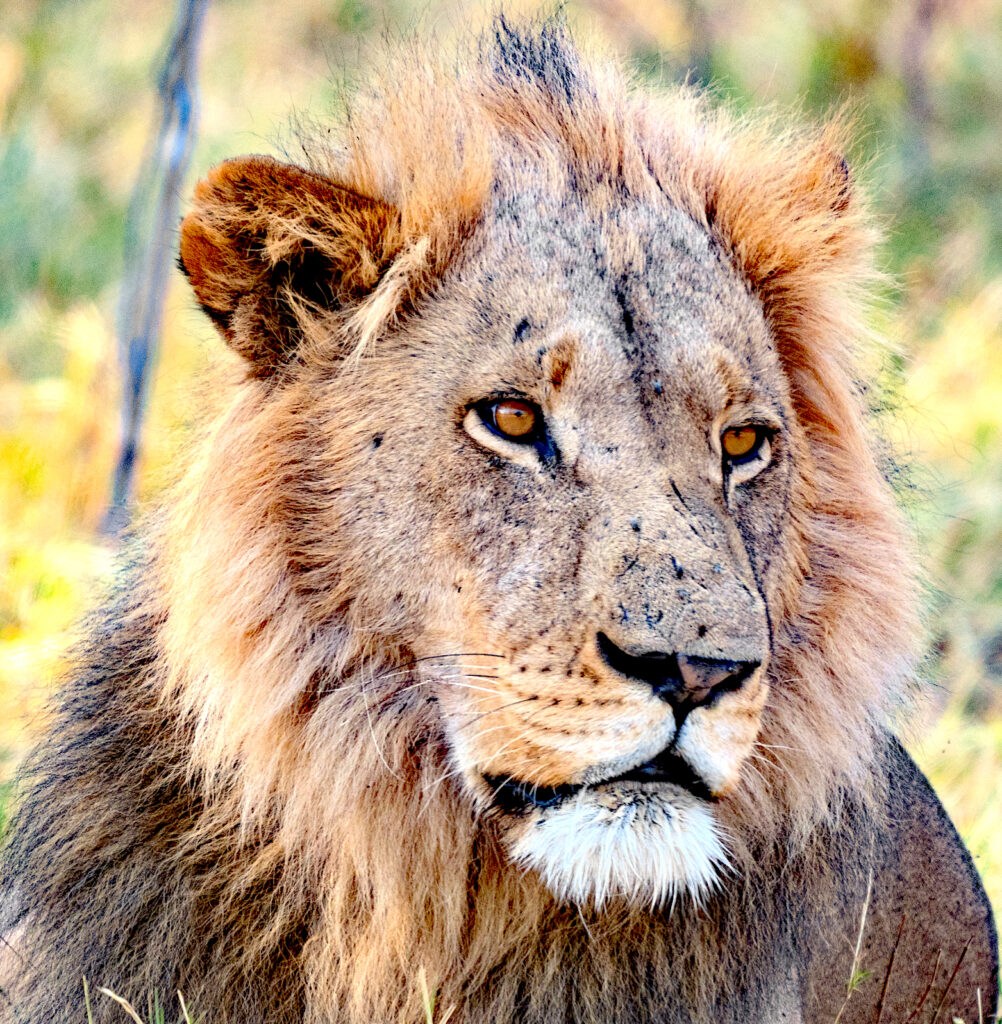
6. Adventurous Experience — Harkens back to the original safari experience
Since there are fewer tourists in Botswana, it creates a more intimate safari experience. It also translates into a much more adventurous safari that harkens back to the old days when Africa was relatively untouched by the rest of the world.
When you go on Safari in South Africa, Kenya, or Tanzania, you’ll notice that the animals tend to be very tame. Just search for videos on YouTube of cheetahs jumping on cars or a herd of zebra walking right near a car. There are so many tourists funneled through these destinations every year that the animals are desensitized. You might as well be at a zoo for all the attention the wildlife will pay to you.
That’s not the case in Botswana. Many animals in Botswana’s Okavango Delta and Kalahari Desert are still skittish around cars and people, which makes for a very different experience. It truly feels like you’re in the middle of the African Bush searching for incredible animals. Every day is an adventure, wondering what you’ll find and encounter. And because the animals are less used to humans, you always feel privileged when you have a fantastic sighting.
For example, we ran into a cheetah on our last time out that clearly did not recognize the sound of vehicles. As soon as it heard our engine, it took the cautious approach and disappeared. And while it was disappointing not to have more time with the cheetah, it was incredible to think that we may have been some of the first people to ever see him.
When you go on safari in Botswana, you feel more like an explorer, braving uncharted territory. And you feel grateful and proud of every perfect picture captured, and experience enjoyed.
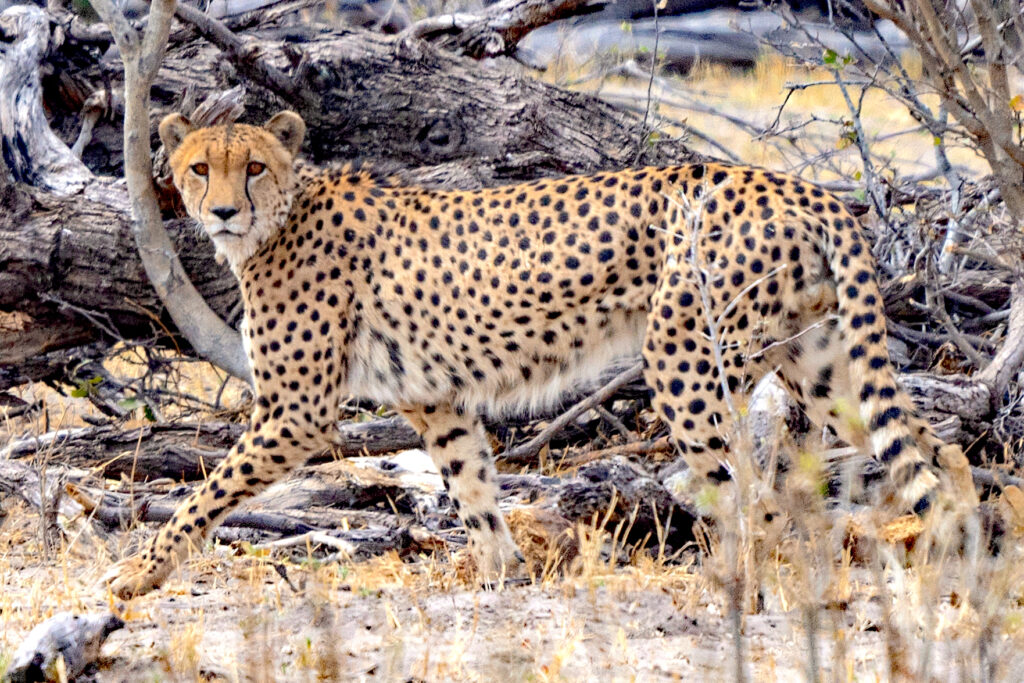
7. Remote Safari Destinations — Bush planes are required to go on safari in Botswana
Part of the adventure experience in Botswana is getting to your camp. While you’ll drive most places in South Africa, Kenya, and Tanzania, Botswana requires bush planes. The Okavango Delta is massive and can swell to three times its permanent size in the rainy season. This means that driving to your remote camp isn’t feasible. Instead, you have to fly into dirt airstrips.
We think this remoteness is what makes Botswana so incredible. There are no roads near your camp, just dirt paths. A Botswana safari is truly an exclusive and immersive experience where it’s all about the wilderness.
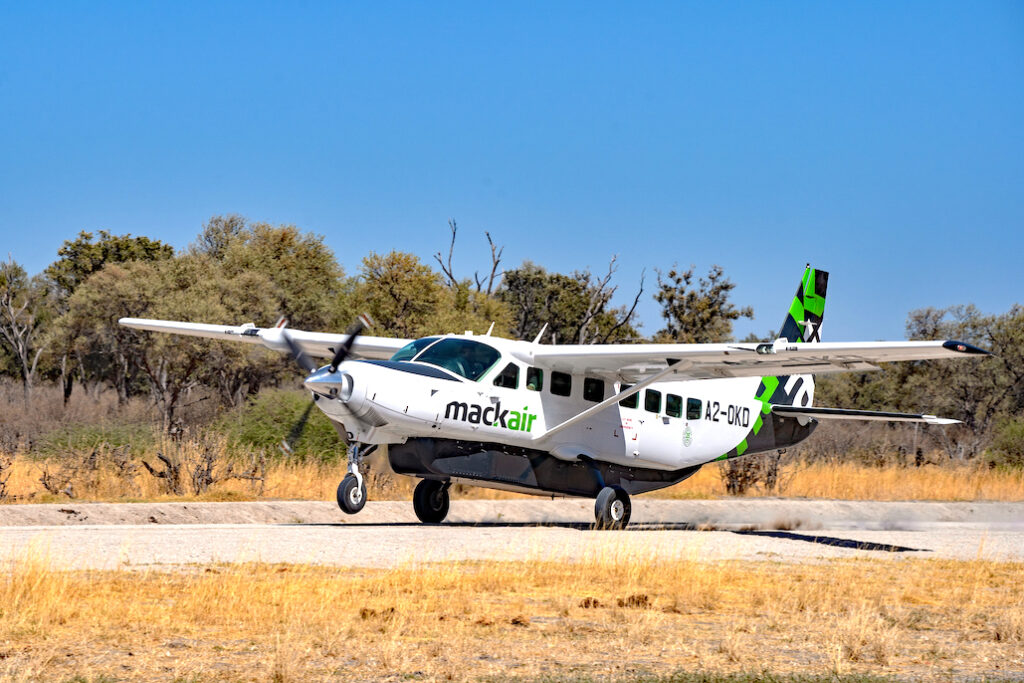
8. LGBTQ Friendly —Tolerance is promoted, and same-sex relationships are legal
This year, Botswana’s High Court unanimously voted to overturn laws that criminalize homosexuality. It was a momentous win for the LGBTQ+ community in Botswana and reflects the values of Botswana’s society.
During the ruling, Judge Michael Leburu admitted that the current laws were “discriminatory” to the LGBTQ community and violated Botswana’s constitution. He argued that overturning them was a matter of “protecting human rights.”
Botswana is actually one of Africa’s most stable democracies. In 2010, they changed their employment act to prevent discrimination against the LGBTQ community. And in 2017, the High Court ruled in favor of a transgender man who sought legal recognition as a male. 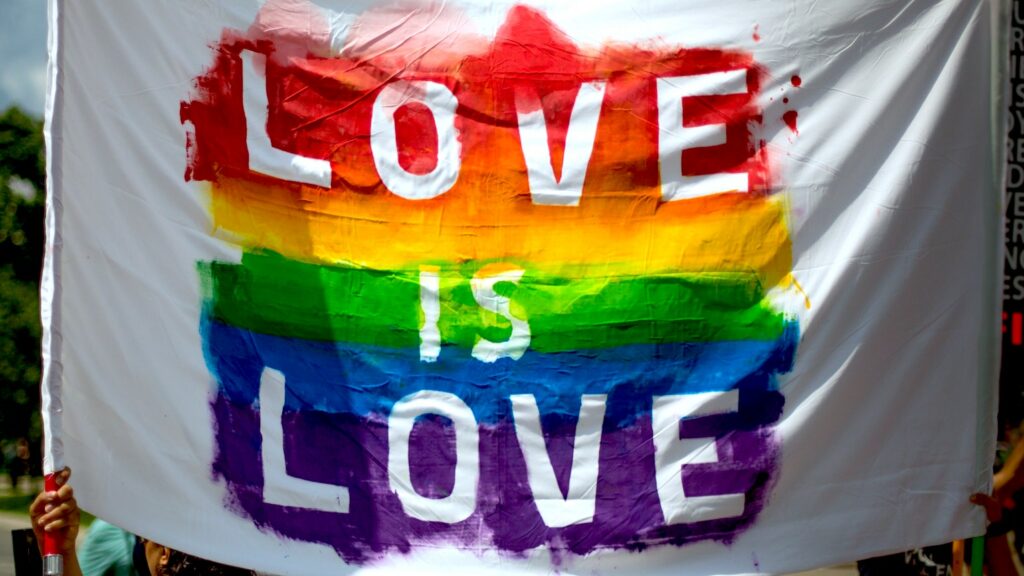
9. Friendly People —Botswanans are some of the nicest people you’ll meet
Botswana might be one of the least densely populated countries in the world, with a population of just over 2 million, but its people are the best. Botswanans are some of the friendliest and most accommodating people that you’ll meet. They take great pride in their country and in giving their best in everything they do.
You’ll be welcomed into Botswana with warm smiles and open hearts. Culturally, singing is incredibly important, so you’ll likely enjoy a song or two during your visit. You might even get to enjoy a few ululations on behalf of Botswanan women, as they show their excitement and happiness.
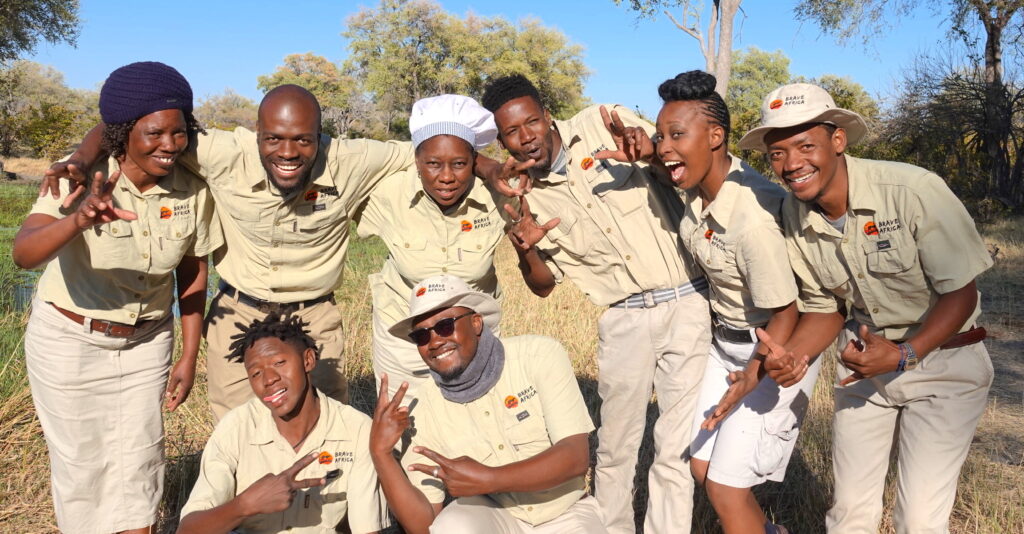
10. Best Safari Location — Botswana is regularly ranked as one of the best safari destinations
Chobe National Park is ranked as the #3 best safari destination in Africa by Fodors. It earns this prestigious title because of its incredibly dense game concentration. The area is “teeming with wildlife year-round,” Fodors writes. They also call Chobe a “stronghold of endangered species such as wild dog, cheetah, and brown hyena.” In particular, they recommend the Savuti Marsh, which we visit on our safaris.
CNN Travel recently put Botswana’s Kalahari Desert on its list of the eight best safari destinations in Africa. They write, “the Kalahari Desert represents Africa at its most brutally wild.” They highlight it as a “land of pure adventure” where you can gain insight into the diversity of Africa. They state, “there’s nothing better than a two-stop safari combining the shimmering pans of the Kalahari with Okavango wetland wilderness.”
Botswana also shows up on CNN Traveler’s “Most Beautiful Countries in the World” list. They talk about the Okavango Delta, calling it a “real-world Eden, where cheetahs, zebras, buffalo, and rhinos roam freely.”
According to Conde Nast Traveler, “Your First Safari Should Be in Botswana.” The article talks about the country’s unique tourism model that focuses on fewer people, but high spenders, so the economy grows, and there’s as little impact on the environment as possible.
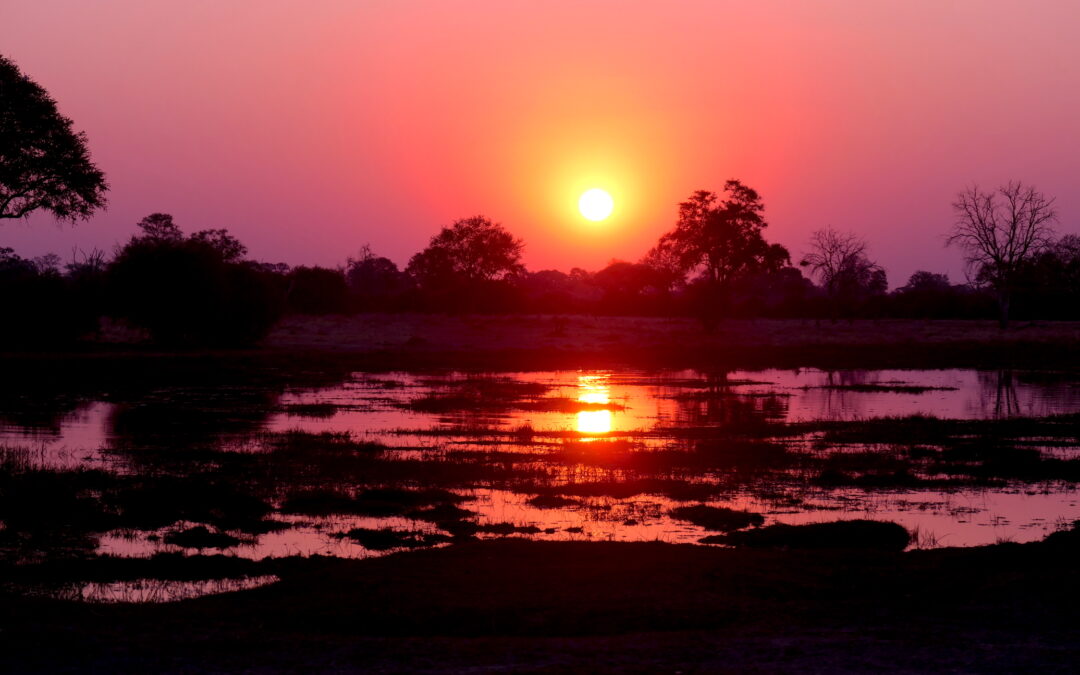
Sep 28, 2019 | Adventure Safari, Brave Africa Safari, Game Drive, Most Popular Blogs
Out of dozens, if not hundreds, of safaris, what’s the Brave Africa difference? What makes us stand out and why should you choose to join us on your first, second, third, or hundredth safari? It’s all about our all-day safari experience compared to the traditional African safari experience!
The All-Day Safari Experience
Guests go on a Botswana safari for one reason only: to see Africa’s many amazing animals. They want to go home with incredible photos, unbelievable videos, and memories that will last a lifetime.
That’s why, at Brave Africa, our number one priority is to ensure that you have an unforgettable all-day safari experience.
To make that possible, we take our guests on all-day game drives. This increases your possibility of seeing something astonishing by keeping you out of camp and in the Bush as long as possible—after all, you have a 0% possibility of an amazing animal sighting from inside your tent.
12 to 13 hours in the Bush instead of 6 to 7 hours
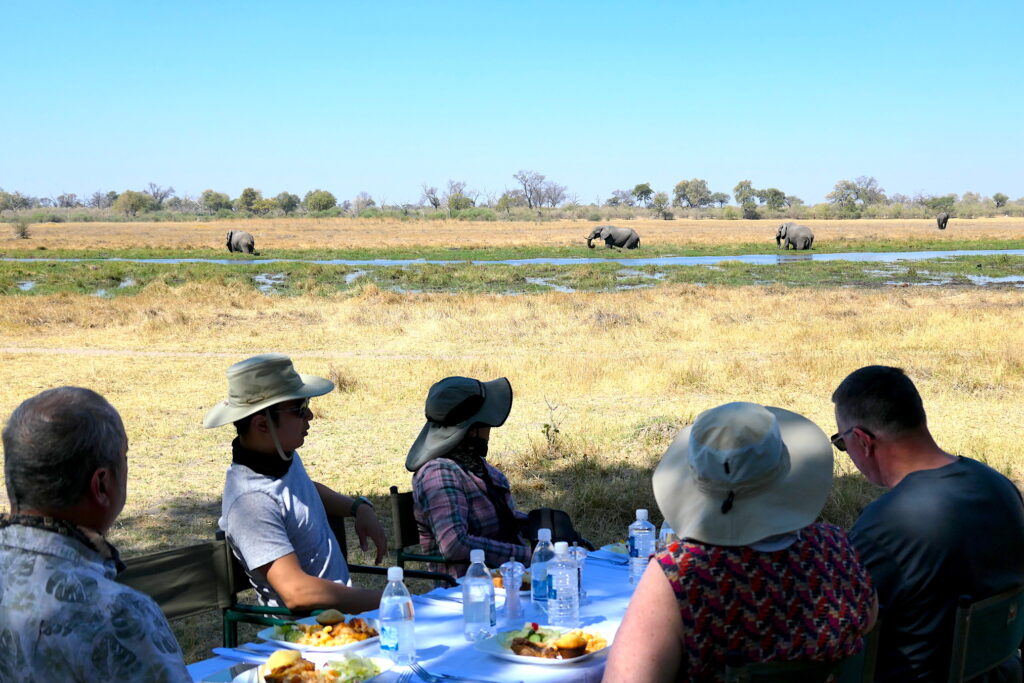
Lunch in the Bush means you get to choose amazing views like this one.
At Brave Africa, you get almost double the time in the Bush as you enjoy on a traditional safari.
On our all-day game drives, you head out of camp at sunrise—between 5:30 am and 6:30 am—and you don’t come back until sunset, or slightly after (6:00 pm – 7:00 pm). In total, you get 12 to 13 hours in the Bush every single day you’re on an all-day safari with Brave Africa.
On a traditional African safari, you have 3 to 4 hours on your morning game drive—from sunrise until around 10:00 am. After that, you’re back at camp for almost 6 hours for lunch and an afternoon nap. Then, you’re finally back out in the Bush at 4:00 pm until sunset for another 2 to 3 hours on a game drive.
That’s just 6 to 7 hours in the Bush with the other 6 hours spent at camp.
Cover more ground instead of being stuck near camp.
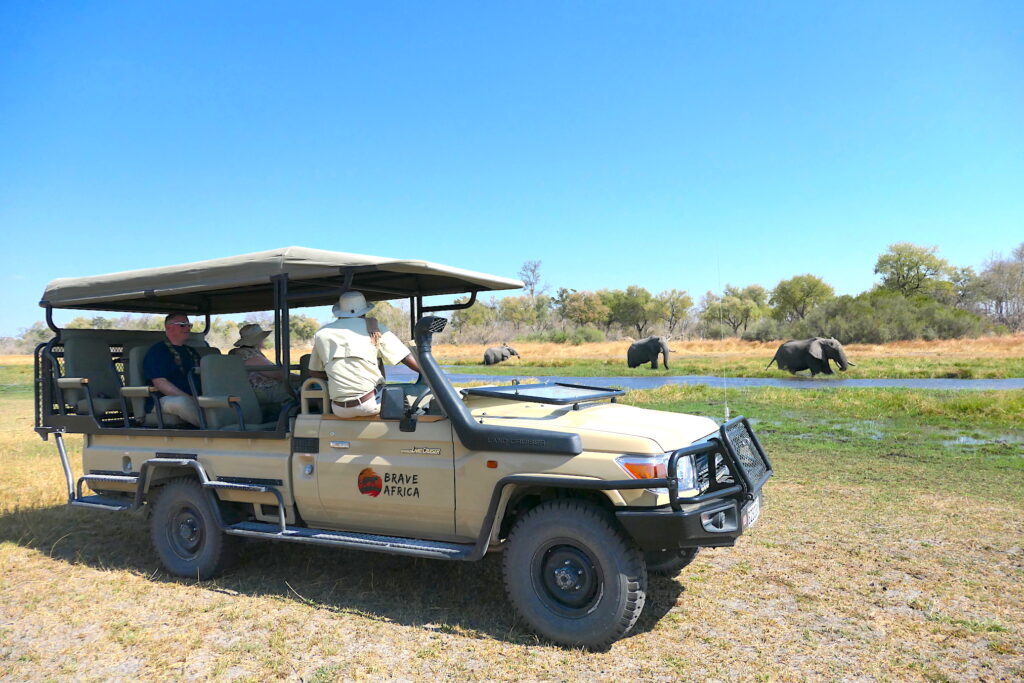
Your Brave Africa safari vehicle can travel almost 6 hours in one direction before having to turn around, which means you can really explore the bush.
Being out on our all-day game drives also means that your Brave Africa car can travel long distances. Since we don’t have to be back at camp until evening, we can really explore the area, following the animals where they go or even just to enjoy a change of scenery.
However, because traditional safaris require you to be back at camp within a few hours, your area of travel is highly limited. You can’t explore too far from your home base or you won’t make it back for lunch.
A pace you control instead of a set schedule.
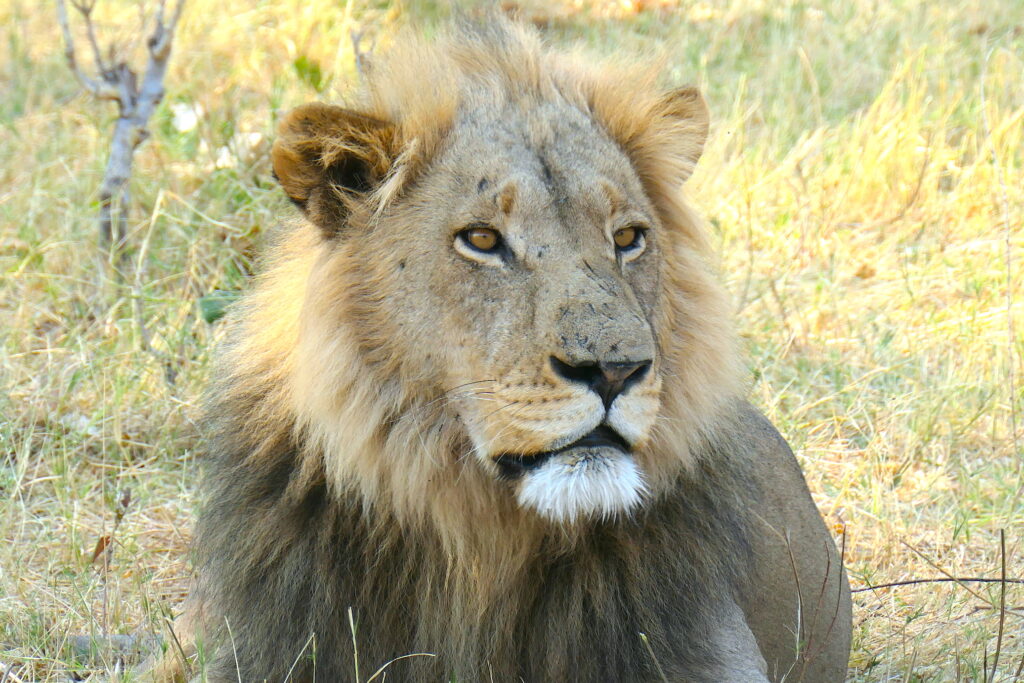
If you are enjoying an incredible sighting of a male lion, you don’t have to leave because you’re on a schedule. You can stay as long as you want.
Twelve to 13 hours in the Bush every day doesn’t mean you never have a chance to breathe or relax. Instead, it means the Bush and the animals help decide your day instead of trying to force nature to conform to our schedule.
So, if your game drive is really packed full of animals, you can put off your rest times until there’s a natural break. However, if the day is slow, you can rest early and give more time to your afternoon. Whenever you’re ready for a break, your guide will find a gorgeous spot in the bush—under some shade—where you can rest, relax, eat, drink, and enjoy the beautiful scenery.
On a traditional African safari, your day is scheduled for you. Yes, if you have an incredible sighting you can stay out longer, but there is always time pressure to get back to camp for lunch. Your schedule is controlled by the camp and not by nature, which can make you feel a little more like you’re in a theme park instead of on a Botswana safari.
Why Do You Want All-Day Game Drives?
So, why are all-day game drives what you want when you go on safari?
- Sometimes during the heat of the day—from 10 am until 3 pm—is the best time to see animals. It was during these hours that on one all-day game drive our guests and team ran into a cheetah hanging out and watching some warthogs.
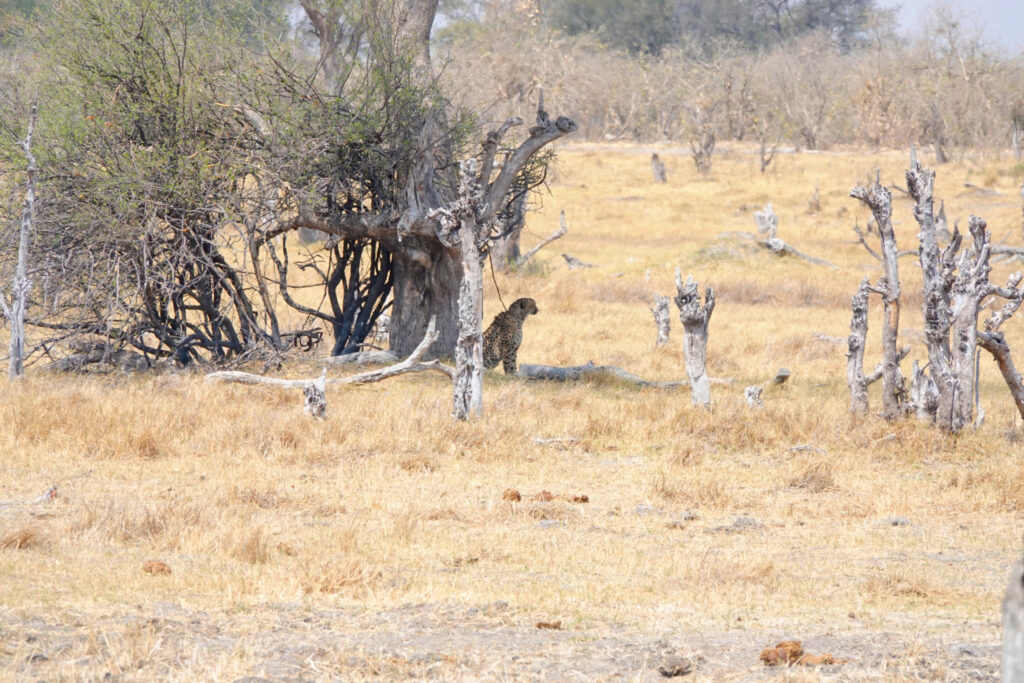
We saw this cheetah around 1 pm during an all-day game drive.
- Botswana is a desert. It’s HOT, especially in the middle of the day. It can easily reach over 40 degrees (C)—over 100 degrees (F)—and that’s hot no matter who you are or where you’re from. Would you rather be roasting in your tent in the middle of the day—few if any camps or lodges in the Bush offer air conditioning in your tent? Or would you rather enjoy the natural air conditioning offered by a moving, open-air vehicle and the chance to see incredible animals?
- A Botswana safari is not cheap. If you’re paying thousands of dollars do you want to pay for an all-day safari or a traditional African safari where you spend half of your time back at camp? You’re basically paying to take a nap instead of paying to spend time with the animals.
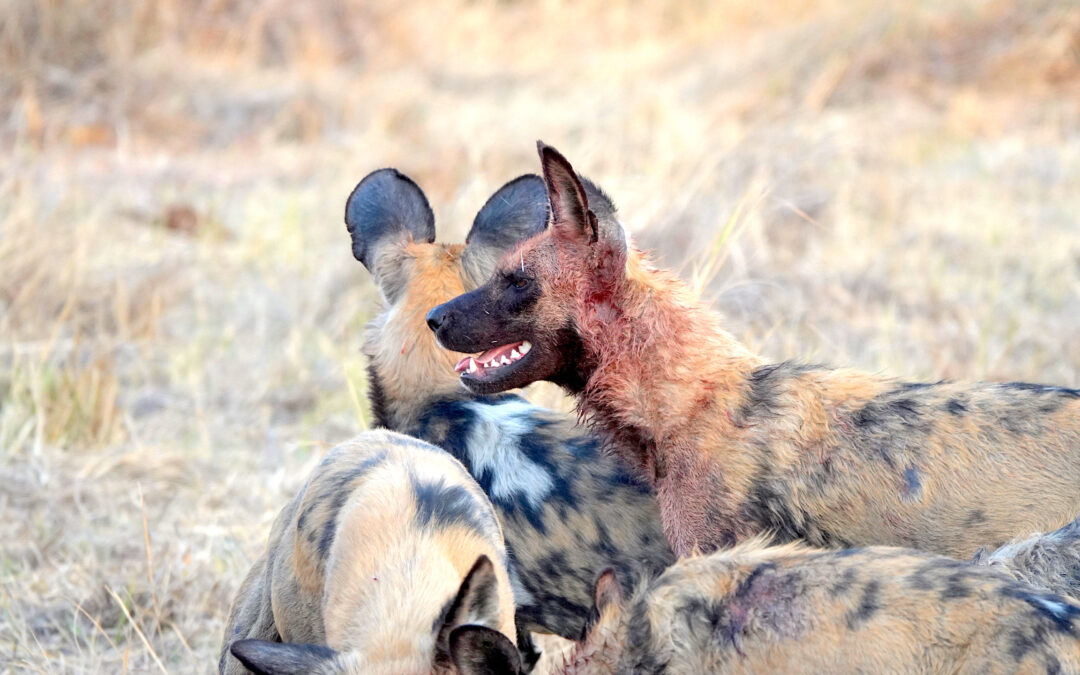
Sep 20, 2019 | Adventure Safari, Animals of Botswana, Brave Africa Safari, Game Drive, Most Popular Blogs
We just completed Brave Africa’s very first full safari, and it was incredible! When you imagine the once-in-a-lifetime experiences you’ll have on a Botswana animal safari, we hit every single one.
It was breathtaking.
If you’re looking for the best animal sightings in Botswana, we had them! (more…)
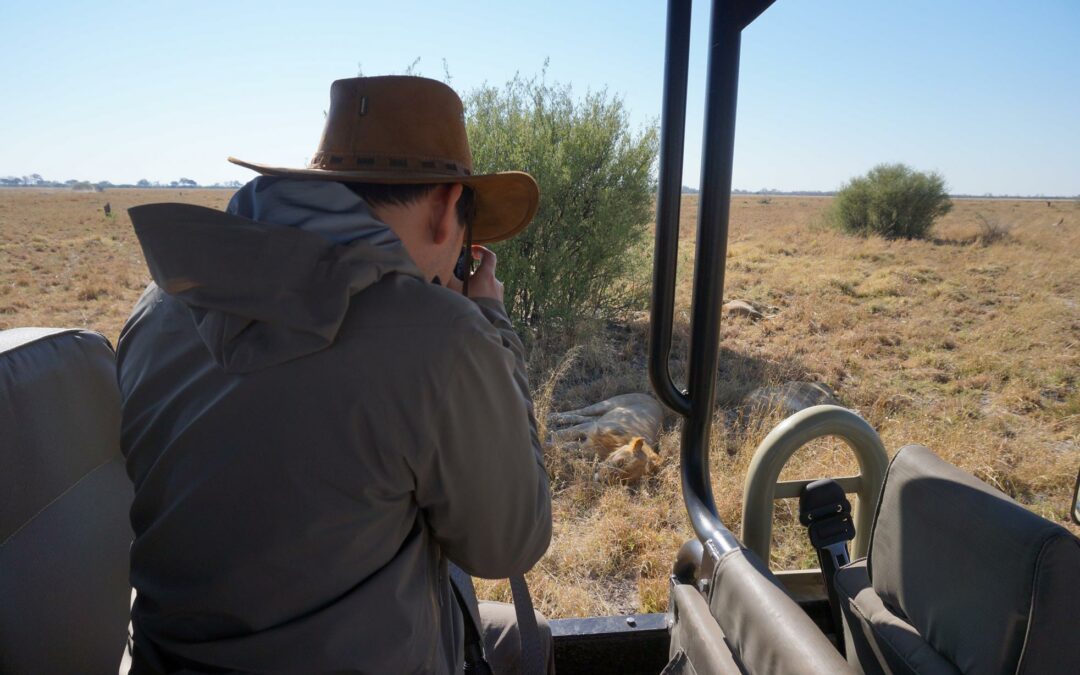
Jun 16, 2019 | Adventure Safari, Brave Africa Safari, Most Popular Blogs
If an African safari is on your bucket list, there’s probably one thing you dream about—seeing the animals.
- You want to experience elephants up close and personal.
- You want to watch a lion walk right by your vehicle within touching distance.
- You want to sleep under an African sky and experience a world mostly untouched by time.
That’s what an adventure safari is all about.
What is an Adventure Safari?
An adventure safari is different from your typical safari experience in one simple but profound way—you don’t waste time at camp.
On a traditional safari, you go out on bush drives in the morning and then again in the afternoon. During the middle of the day, you’re back at camp. At this time, you’ll eat lunch and have a few hours to lay by the pool, nap, and twiddle your thumbs.
For some people, that might sound perfect. They want a plunge pool, a TV on the wall, and Internet access at all times. They want a luxury hotel that also happens to offer wildlife viewing like a zoo. But that’s as inauthentic as it gets.
Why would you go to Africa for the same experience you could get at a theme park? You don’t want a horrible experience like this!
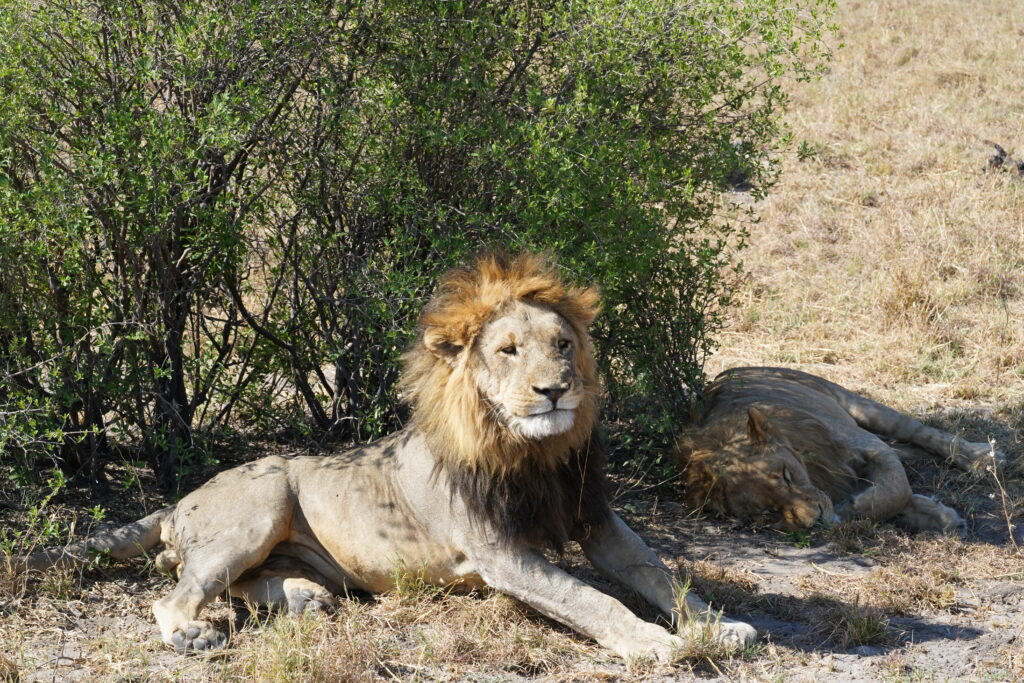
A lion hanging out during the middle of the day, right after lunch.
With an adventure safari, the focus is less on luxury and more on experience.
While you’ll still stay in comfort, you also won’t be spending much time at camp when you choose Brave Africa. After waking up right around sunrise, you’ll have a quick breakfast before heading out into the Botswana bush. Then, you’ll stay out all day long on your safari drive, which gives you the most time possible with the wildlife.
Instead of being back at camp, wondering about what’s happening out with the animals, you’ll be out driving around seeing and experiencing more of everything. We go on all-day game drives from morning until night. After all, you came all the way to Africa to see the animals, don’t you want to spend your time with them and not sleeping?
But aren’t the animals most active only in the morning and evenings?
Yes, the early morning hours right around sunrise and evening hours near sunset are some of the best times to see the animals when they’re active, but they don’t return to their homes during the middle of the day. The animals are always out and about no matter what time it is—even under the hot noon sun. So, if you don’t want to miss out on even a second of seeing the animals, then you need to be out exploring.
Three Stops, One Mobile Safari
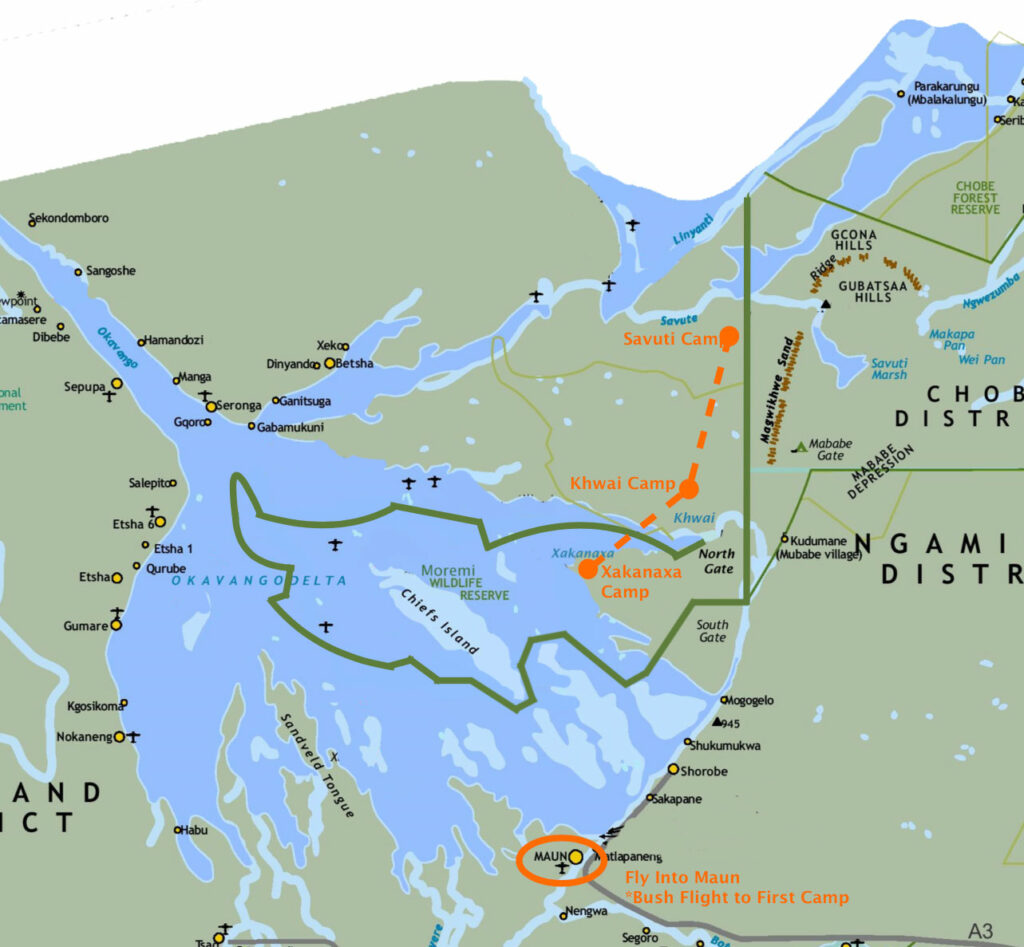
Brave Africa takes you to three different locations—Xakanxa, Khwai, and Savuti—all without any additional bush flights or travel that takes you away from the African bush.
Another key to an adventure safari is that you don’t just get to experience one location; you get to experience up to three different camps. Instead of having to book a different lodge every time you want to see a unique landscape in Botswana, we take you to diverse landscapes while on safari, which saves you travel time that would otherwise mean spending time away from the animals and on a bush flight.
With Brave Africa, you start at one location (Xakanaxa or Savuti), spend three days there, and then during one of your all-day game drives, we move your camp to the next area, Khwai. After another three days, you move to your last location all without having to lift a finger or leave the bush to get there. Our staff takes care of moving your tent between each camp—tearing it down and getting it set up—while you’re out enjoying the animals.
A Safari Under Canvas
Finally, an adventure safari is all about getting close to the landscape, the animals, and the feel of Africa. That’s why Brave Africa is a safari under canvas. You’ll stay in luxury tents with plush mattresses, flush toilets, and all the typical amenities of a hotel, but at the same time, it won’t feel like any hotel you’ve ever stayed at.
Our bucket shower is a one-of-a-kind experience that you’ll want to brag about when you get home. After all, when else will you have the opportunity to take a shower under an open sky with freshly heated water on demand?
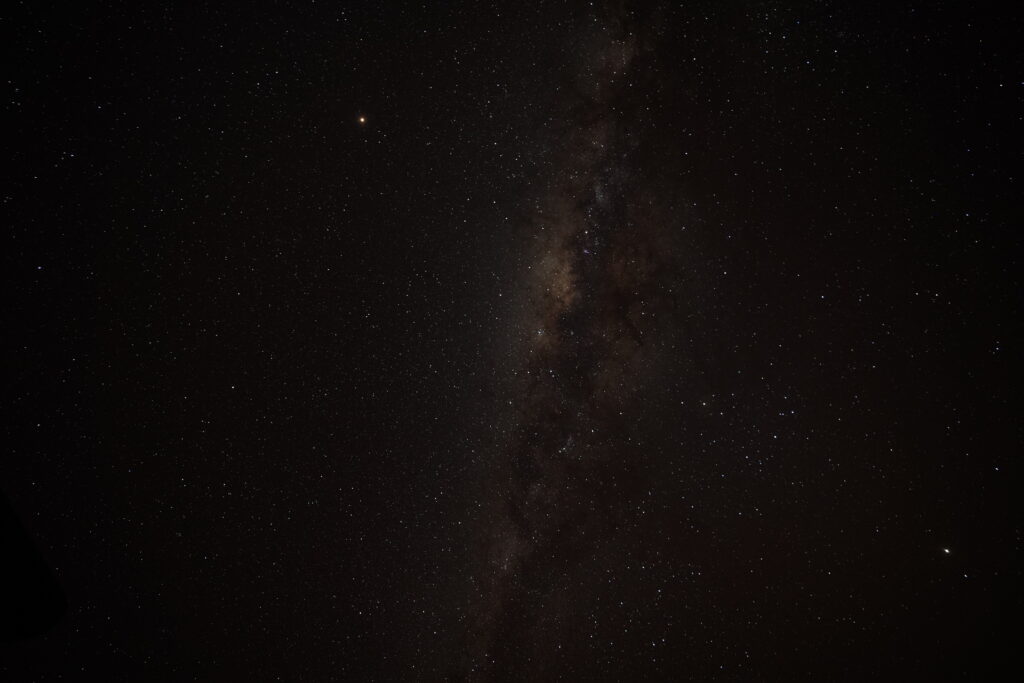
The unforgettable Botswana night sky.
The crystal clear Botswana sky at night is unforgettable!
As for your tent, it keeps you protected from the elements and the animals while still allowing you to be a part of it. A tent means you get to hear the wildlife at night, which is an experience you’ll never forget. It also means that even when you’re at camp, you’ll still feel like you’re on safari.
Is an Adventure Safari Right for You?
So, is an adventure safari with Brave Africa right for you? There are a few questions you need to ask yourself.
- Why are you going on safari? If your goal is to see the animals, be out in the bush, and explore the many different landscapes of Botswana, then an adventure safari is what you want.
- How luxurious do you want your camp to be? If you’re going on safari to take pictures of yourself by the plunge pool, sipping expensive whiskey, and feeding giraffes, Brave Africa isn’t what you want. We try to bring you as close to the African bush as possible with experiences focused on wildlife nut luxury and dedicated to being real, not Instagram setup.
- Do you go on vacation to experience and do as much as possible or to nap? You can nap at home. You spent so much money to go to Botswana on safari, wouldn’t you rather that money be spent on activities than sleeping?





























